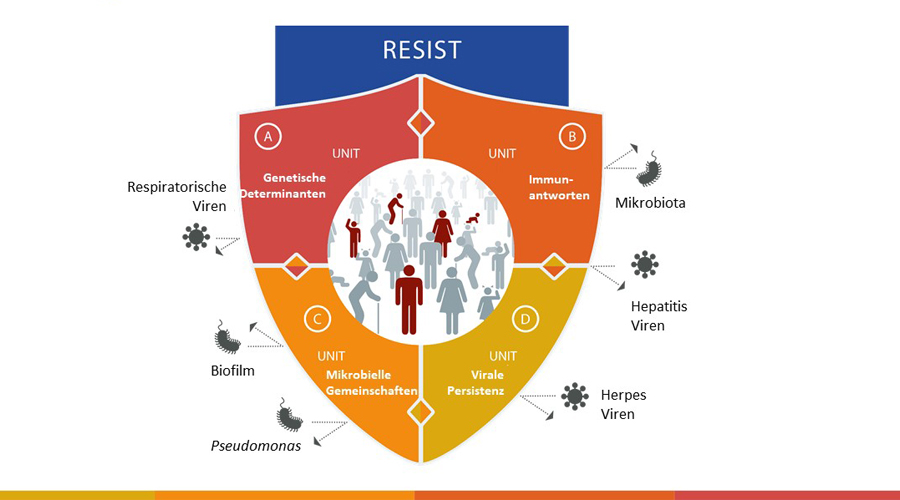About our research
RESIST pursues research for people whose immune system is not strong enough for the defence against pathogens. These are, for example, newborns, seniors, people with a congenital immune deficiency and people whose immune system is attenuated for therapeutic reasons or who have been transplanted with an organ or stem cells.
RESIST scientists investigate pathogenic viruses and bacteria as well as the human defence mechanisms – and especially how both of them interact with each other. Our approach involves clinical and patient cohort studies as the basis for basic research.
We are pleased that RESIST is so international: many people in our RESIST team come from abroad and / or work with colleagues in institutions around the world, and many (post)doctoral students have also joined us from abroad. Read more about this on our page “Internationalisation”.
Four project areas – one goal
RESIST research is organised in four project areas:
Area A comprises all projects that deal with genetic factors: The role of human genes and gene variants for susceptibility to infections is investigated. Area B is all about the human immune system and why some people are particularly susceptible to infections with viruses and bacteria, for example newborns and elderly individuals. In areas C and D, pathogenic bacteria and viruses respectively are analysed: How do they “settle” permanently in the body and cause chronic infections – for example in the lungs, liver and on implants?
Patients are at the centre of all efforts: The common goal of all research areas is a better protection of vulnerable people by better prediction of the course of an infection or by improved diagnostic and therapeutic options.
The scientific questions of our individual projects
A1 | Severe lung infections – Which genetic factors make some children particularly susceptible?
A3 | Varicella-Zoster – Which genetic factors lead to severe disease progressions?
A5 | What genetic changes predispose people to infections?
A6 | Is the human virome a potential factor of infection susceptibility?
B1 | Which influence do intestinal bacteria have on susceptibility to infection?
B2 | Can intestinal bacteria trigger rheumatological diseases?
B3 | Which impact do intestinal bacteria and infections have on the fitness of immune cells?
B4 |How can immune receptors be used for therapeutic puposes?
B5 | Do advanced age and allergies contribute to the reactivation of dormant herpes viruses?
B7 | Does age have an effect on immune responses against viruses?
B8 | Chronic hepatitis B: Why do some people recover spontaneously after therapy disruption?
B9 | Hepatitis B – What causes vaccine failure and which new therapies are possible?
B10 | Hepatitis C – Which immune response can contribute to the development of a new vaccine?
B11 | Cholangitis – Which individual therapy approaches are possible?
B12 | Can bacterial infections be treated with ubiquitins?
B13 | How can we fight lung infections?
B14 | How does the hepatitis D Virus bypass the immune system?
D1 | Herpesvirus: How can we stop the life cycle of persistent viral pathogens at an early stage?
D2 | What new therapeutic options open up, from research into the assembly process of herpesviruses?
D3 | Herpesvirus infections: How can novel drug targets be identified?
D5 | Which paths lead to new inhibitors against human adenoviruses?
D6 | Why do infections with hanta- and arenaviruses progress so differently?

